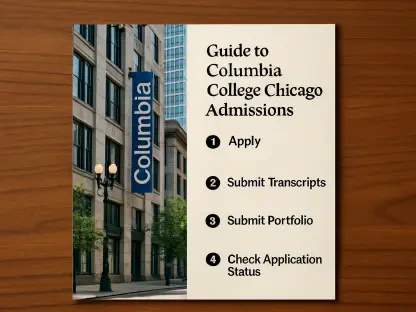In a landscape where higher education increasingly finds itself at the crossroads of politics and academia, a small liberal arts institution in Florida has sparked intense debate over its recent decisions. New College of Florida (NCF) has become the first to publicly embrace a higher education compact proposed by the Trump administration, a policy framework designed to align federal funding with conservative-leaning priorities. This decision stands in stark contrast to the broader academic community’s resistance, raising questions about the future of institutional autonomy and the role of political influence in shaping college campuses. This roundup gathers diverse opinions, insights, and critiques from various stakeholders in the higher education sphere to explore what NCF’s bold move means for students, educators, and policymakers navigating this polarized terrain.
Diving into the Debate: Why NCF’s Decision Matters
The announcement by NCF to adopt the Trump administration’s higher education compact has ignited a firestorm of discussion across academic circles. This policy, which ties federal funding to stipulations like tuition freezes and institutional neutrality on social issues, was initially pitched to major research universities, most of whom rejected it. NCF’s willingness to align with these demands, however, positions it as a unique case study in the ongoing struggle between political agendas and academic freedom. Various perspectives highlight the complexity of this issue, from concerns about ideological overreach to arguments for reforming outdated educational models.
A significant portion of the academic community views NCF’s decision with alarm, pointing to the potential erosion of independent thought. Many educators and administrators argue that accepting such a compact risks turning colleges into tools for political agendas rather than bastions of critical inquiry. This sentiment is particularly strong among those who see the compact’s requirements as a direct challenge to the diversity of ideas that universities traditionally foster, especially in areas like social justice and cultural studies.
On the other hand, some conservative commentators and policy analysts applaud NCF’s stance as a necessary correction to what they perceive as liberal bias in higher education. They contend that the compact’s emphasis on merit-based principles and open dialogue offers a refreshing alternative to institutions mired in ideological conformity. This divide in opinion sets the stage for a deeper exploration of how NCF’s transformation under political influence is perceived across different sectors.
Unpacking NCF’s Conservative Pivot: Varied Reactions
A Shift in Identity: From Progressive to Conservative
NCF’s journey from a progressive, inclusive campus to a model of conservative education has drawn sharp reactions from multiple corners. Under the influence of Florida Governor Ron DeSantis, the college has undergone a dramatic overhaul, including the elimination of diversity, equity, and inclusion programs. Critics within academia argue that this transformation, driven by a politically appointed board, undermines the very essence of shared governance, a cornerstone of higher education integrity.
Supporters of these changes, including certain policy think tanks aligned with conservative values, see the shift as a bold return to foundational educational principles. They argue that stripping away what they term ideological programs allows for a focus on academic rigor and individual merit. This perspective often frames NCF as a pioneer in resisting what they view as the overreach of progressive ideologies in public institutions.
The tension between these views reveals a broader concern about whether such reforms genuinely enhance learning environments or simply serve as vehicles for political control. Many faculty associations have expressed worry over the precedent this sets for other public colleges, fearing a domino effect that could reshape academic priorities nationwide based on electoral outcomes rather than educational needs.
The Trump Compact: Diverse Interpretations of Its Impact
The specifics of the Trump administration’s higher education compact—ranging from mandatory standardized testing to enforced neutrality on social issues—have elicited a spectrum of interpretations. A number of university leaders from larger research institutions have voiced strong opposition, suggesting that compliance with such policies could stifle intellectual diversity and limit their ability to address societal challenges through research and teaching.
Conversely, a segment of educational reform advocates sees the compact as an opportunity to reset priorities in higher education. They argue that conditions like tuition freezes address affordability concerns for students, while neutrality requirements could curb perceived biases in campus culture. This viewpoint often emphasizes the potential for smaller institutions like NCF to lead by example in adopting these measures without the heavy reliance on federal funding seen in larger universities.
Balancing these opinions, there’s a growing concern among independent analysts about the long-term implications of tying funding to ideological compliance. The fear is that such policies might create a two-tier system in higher education, where institutions with differing financial dependencies face unequal pressures to conform, potentially widening disparities in academic quality and access.
Political Influence in Education: A Spectrum of Concerns
Florida’s role as a testing ground for politically driven educational reforms, with NCF at the forefront, has sparked a wide array of concerns. Many academic policy experts highlight the state’s aggressive push under current leadership to reshape public institutions, including reported plans to redirect resources toward expanding NCF. This trend is often compared to conservative models like Hillsdale College, raising questions about the blending of political and educational objectives.
Some state-level policymakers and conservative education advocates defend these moves as a way to ensure taxpayer funds support institutions aligned with public values, rather than what they see as niche ideological agendas. They point to NCF’s minimal federal funding as evidence that smaller colleges can thrive under alternative models without heavy reliance on government grants, potentially inspiring similar shifts elsewhere.
However, a contrasting perspective from educational governance bodies warns of the risks associated with prioritizing political goals over student and faculty needs. There’s a shared apprehension that such interventions could undermine the credibility of public higher education, turning campuses into battlegrounds for partisan disputes rather than spaces for unbiased learning and growth.
NCF Versus the Academic Norm: A Clash of Ideals
Comparing NCF’s approach to that of the academic mainstream reveals a profound ideological divide. Many traditional university administrators note that NCF’s limited dependence on federal grants—amounting to a modest sum compared to research giants—may ease its alignment with the compact. This financial independence, they argue, sets it apart from peers who rely heavily on such funding to sustain expansive research and student aid programs.
In contrast, some reform-minded educators and analysts suggest that NCF’s outlier status could serve as a blueprint for other small colleges seeking to differentiate themselves in a competitive landscape. They propose that embracing alternative funding models or policy frameworks might offer a way to resist the pressures of mainstream academic norms, which they often criticize as overly homogenized or resistant to change.
This clash of ideals prompts a broader reflection among higher education observers about whether NCF’s path represents a sustainable alternative or a risky divergence. The concern lingers that while such a stance might appeal to certain ideological factions, it could isolate the college from vital scholarly networks and collaborative opportunities essential for long-term relevance.
Key Takeaways from the Roundup
Synthesizing the myriad perspectives on NCF’s embrace of the Trump higher education compact, a few critical insights emerge. The divide between those who see this as a dangerous politicization of academia and those who view it as a necessary recalibration of educational values remains stark. The compact itself, while rejected by most major institutions, finds a willing adopter in NCF, highlighting how institutional size, funding structures, and political climates shape responses to such policies.
Another recurring theme is the tension surrounding Florida’s role in driving these changes, with opinions split on whether state-level interventions enhance or erode the mission of public education. Stakeholders across the spectrum—ranging from faculty groups to policy advocates—agree on one point: the outcome of NCF’s experiment will likely influence how other colleges navigate similar pressures in the years ahead, particularly under shifting political winds.
A practical observation drawn from these discussions is the need for transparency in how such reforms are implemented. Many voices call for mechanisms to ensure that academic integrity isn’t sacrificed for political expediency, suggesting that robust dialogue between administrators, educators, and students could serve as a safeguard against unilateral overhauls that disregard campus communities.
Reflecting on the Path Forward
Looking back on the debates surrounding NCF’s alignment with the Trump compact, it became evident that the intersection of politics and higher education posed challenges that demanded careful navigation. The diverse opinions gathered underscored a shared urgency to address how institutions could maintain their core missions amid external pressures. Moving forward, stakeholders were encouraged to prioritize the establishment of clear guidelines that protected academic freedom while allowing for constructive policy reforms.
One actionable step that emerged was the promotion of collaborative forums where educators, policymakers, and students could openly discuss the implications of such compacts. These platforms could foster mutual understanding and help mitigate the risk of ideological entrenchment. Additionally, advocating for increased funding diversity was seen as a way to reduce reliance on politically conditioned grants, thereby preserving institutional autonomy.
As the higher education landscape continued to evolve, another consideration was the importance of monitoring NCF’s outcomes as a case study. Observing how its student body, faculty morale, and academic reputation shifted over time offered valuable lessons for other colleges facing similar crossroads. This reflective approach aimed to ensure that the pursuit of ideological goals did not overshadow the fundamental purpose of education: to nurture critical thinkers equipped for a complex world.









